I understand that there are hundreds of books that explain the mechanics of writing academic articles. My aim here is not to dwell on the mechanics, but to rather give you some basic ideas about the process of choosing a topic, researching about it, and then composing the first draft of your academic articles. If you are a graduate student, please keep in mind one simple principle: Write every class paper as if you aim to publish it! This principle will force you to write papers that are worthy of your time and that have some possibilities instead of writing about things that have been covered, probably more eloquently, by other scholars.
Coming up with a Topic for your Academic Articles
This is one of the most important steps in writing academic articles: choosing a topic. This applies especially to all those who are slogging through their graduate studies, often overworked and underpaid. As a key principle, one that has helped me a lot, always choose something that is eventually publishable. Think of it this way: you have to produce a good paper that would take your time and effort, so why not put your efforts into something that can be, with revisions, eventually published. Here are some of the steps that would help you choose your topic:
- Choose something that you care about: I know this sounds like a cliché, but if you are going to put so much effort into a writing project, make sure that you care enough about it to sustain the activity. Furthermore, chances are if you care about an issue, it will eventually figure prominently in your future work. Therefore, use the forced opportunity of a graduate course to write about something that is likely to be important to you in the future.
- Perform broad research. Broad research is usually synchronic: it means you look for whatever has been recently published about your tentative topic. This allows you to learn varied perspectives about your topic and will also enable you to place your argument within a contemporary discussion.
- But what if nothing has been published about your chosen text? Well, that is a good thing! You can still read works that are tangentially related to your topic and then offer your views about an unexplored or “undiscovered” text!
Where to start Your Academic Articles?
MLA International Bibliography, available at all research universities, is the ideal place to start your research for academic publishing. Just look up your topic, author, or text and see what all has been published about it or related to it in the last few years. If possible, at least download and print the abstracts to get a general idea about what has been published.
This basic exercise into finding whatever has been done about your possible topic is crucial as it allows you to figure out whether or not what you are planning to spend so much of your time and energy on is a topic worthy of your effort. Thus, the research in breadth will decide whether you want to keep the chosen topic or want to amend it or abandon it altogether.
Look at the pictures below as an example of a general search using the MLA International Bibliography:
Conduct in-depth Research for your Academic Articles
Now that you have researched in breadth and honed your possible topic, it is time to perform deep research. This involves reading selected major articles related to your topic as well as any major books that have been published about it. At the least, based in my own experience, you will read at least ten relevant articles and a few books to really grasp what is being said or has been published about your chosen topic.
After you have read in-depth, you will now be able to decide the ultimate fate of your topic and if you still think you can say something different or “original” about the topic, in comparison to other works published about it, then now you have the point of entry into the scholarly conversation. Finding this point of entry is crucial, for otherwise you will end up writing an article that has already been written!
Furthermore, when you submit your article, your reviewers will not only be looking at your article alone but will also be evaluating whether or not you are aware of the works on the similar topic published by others. And if you engage with those works in your essay, the reviewers will further evaluate as to whether or not what you are saying is comparatively good enough to be considered worthy of publication!
Ask Around and Seek help
Even though we are trained to think of ourselves as lone-wolf researchers, we do live in an extremely connected and collaborative world of research. If you are in a graduate program and writing a paper for your class, your professor and your colleagues are a wonderful resource during the incubatory period of your research, and even during the writing process.
Do contact your professor and request to discuss your paper ideas with her. Chances are that the professors will point you to certain important texts that you might still need to consult. Jot down those suggestions as the texts or theorists that they mentioned are probably important to them may be important for your paper.
Similarly, do not hesitate to share your paper ideas with your colleagues; they might be able to give you some generalized and some specialized suggestions about your paper.
Also, if you are taking a course but it has nothing to do with your area or concentration, seek out fellow graduate students in your class who might be specializing in that particular area and ask their pinion about your topic. I recall many an instances where I either contacted my fellow students about a paper that was more pertinent to their area of study and similarly I assisted quite a few of my own colleagues when they had questions related to postcolonial theory, my field of expertise. Join the Graduate Student Writing Support group: If none exists, form one!
Now that we have shared some basic ideas, it is time to move on to talk about some basic techniques that I have found useful in writing my articles for publication.
Thesis Statement
As a reviewer of academic articles, I have often noticed that as I start to read an article for review, I am expecting to find out what the paper is arguing about on the very first, or at the least, on the second page. In other words as a referee I am immediately looking for the thesis of a submitted article. Pretty much all major journals in humanities request and ask for a clearly defined thesis for the submitted article. Thus, just from the future publication prospects of an article, it is crucial to have a clear and well articulated thesis. Furthermore, it as also necessary to craft a good thesis, for the quality of your writing would depend upon the clarity of your thesis. The thesis also enables to review your own draft and to understand immediately as to what does not belong in your essay: anything that does not directly or indirectly have a bearing on your thesis. Thus, having a clear thesis is important both for the quality of your paper and for the chances of its eventual publication.
Crafting a Thesis
The thesis also decides the kind of paper you will end up writing and the writing strategies involved will be decided by the specific type of your thesis. There are, generally, papers with three kinds of theses:
- Expository
- Analytical
- Argumentative
Expository Paper: An expository paper usually explains something to a reading audience. Here is a good example:
In this paper I will explain as to how in Salman Rushdie’s Midnight’s Children Salim Sinai is the ultimate unreliable narrator.
Obviously, the very statement of thesis suggests that you as a writer are assuming that your audience does not know much about your subject, and you, therefore, based on your own research or someone else’s research are going to use your knowledge and skills to explain this particular subject to your readers.
In literary studies, all papers that explain how something works [what is a sonnet, for example] would fall into this category. Note, even though the thesis sounds less complex, one can write quite sophisticated papers using such a thesis. The only thing to keep in mind is this: YOU are explaining something to your audience from an authoritative position as a scholar.
Analytical Paper An analytical thesis breaks down an issue or an idea into its component parts, evaluates the issue or idea, and presents this breakdown and evaluation to the audience. (Source). Here is a good example:
Using Chandra Mohanty’s discussion of female agency, In this paper I will analyze the acts of agency performed by the female characters in Flora Nwapa’s Efuru. I will also read the text to further elaborate as to what particular enabling conditions within the plot make such acts of female agency possible.
Note that even though the thesis does use theory, it is only using theory to analyze the acts performed within the body of the text; it is not arguing for or against, hence it is not an argumentative paper, and the attempt to analyze the enabling conditions is also geared toward proving that the acts of female agency do exist in the novel. The analysis, thus, provides an explanation of something present in the novel and elements that make that “presence” possible.
Argumentative Paper: An argumentative paper makes a claim about a topic and justifies this claim with specific evidence. The claim could be an opinion, a policy proposal, an evaluation, a cause-and-effect statement, or an interpretation. The goal of the argumentative paper is to convince the audience that the claim is true based on the evidence provided. (Source)
Using Fredric Jameson’s concept of the ideologeme, I plan to read Osman Semebene’s God’s Bits of Wood to suggest that if solidarity is assumed to be the ultimate ideologeme of the novel, the one can clearly understand the mechanics of the labor strike within the novel and then apply this knowledge to contemporary labor struggles within neoliberal capital.
A paper with such a thesis is arguing that the novel can teach us something about labor strike within the novel but also, the paper argues, this knowledge can be useful in the real-world struggles of the workers. Since the paper argues for a certain specific point of view within the novel and advocates for a certain specific reading, it displays all the major tropes of an argumentative paper.
Conclusion
In this article I have covered the process involved in planning a paper and the significance of crafting a concise and effective thesis. Please bear in mind that a clear thesis will help you organize your paper better and it is absolutely necessary to spend some time in coming up with a strong and clear thesis statement. In the next article I will discuss the actual organization of the . whole paper itself and the process of composing and revising the first draft. (Continue to Part 3)






[…] Part 2 […]
[…] Home/How to Write and Publish Academic Articles in the Humanities (Part 1) Previous Next […]
[…] Home/How to Write and Publish Academic Articles in the Humanities (Part 3) Previous […]